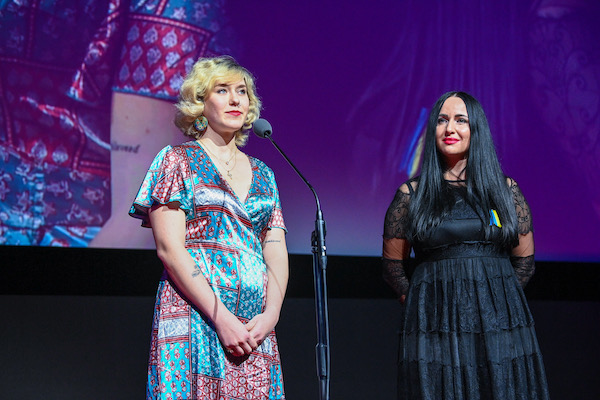
Tetiana Stanieva and Elena Rubashevska at the 2022 EnergaCAMERIMAGE opening night. Photo: Witek Szydłowski.
Opening night ceremonies in the Jordanki Hall at EnergaCAMERIMAGE in Toruń, Poland, are generally upbeat, but those in November, 2022, took a somber turn due to the war in Ukraine. In his introductory remarks, festival director Marek Zydowicz said, “Since February 24th, we stand with Ukraine.” Several other speakers brought up solidarity with the Ukrainian cause.
After listing the nominees up for competition, the hosts introduced two speakers from Ukraine, Tetiana Stanieva and Elena Rubashevska.
Stanieva began by screening a short documentary from Ukraine. It showed wartime conditions in Kyiv and other cities, with sobering visual evidence of atrocities.
What really struck viewers watching the film was a list of Ukrainian filmmakers who have joined the military. Writers, directors, cinematographers, grips, composers — a score of artists were seen first on the job and then in military uniform. Some have been injured or died since the war began. As the film put it, they risked their lives to bring back “svitlo,” or “light.”
“Since February 24, we do not live,” Stanieva said. “Mankind has rarely seen this kind of injustice.”
Stanieva told the audience that a cinematography festival in Kyiv had to be cancelled. Her own festival, the third OKO International Ethnographic Film Festival, moved from Bessarabia, Ukraine, to Torun. Stanieva is the festival director; Rubashevska, the program coordinator.
“We have a dream to invite you all to next year’s festival,” Stanieva said. “If I don’t see you again, I leave you one wish: to help Ukraine in every way possible.”

2022 EnergaCAMERIMAGE opening night. Photo: Pawel Skraba.
Rubashevska fled with no money or documents from the Donbas region to Poland. Three days later she received an invitation to Camerimage, which sponsored the OKO festival. Camerimage provided venues and helped with guests and participants.”Our hope is to promote peace, tolerance, and mutual respect towards each other,” Rubashevska said, before inviting attendees to come celebrate OKO screenings.
The OKO schedule included eight feature documentaries and sixteen documentary shorts, as well as a four-film tribute to Ukrainian cinema.
“I don’t know if Camerimage understands what they did for us,” Stanieva said in an interview at OKO’s awards ceremonies. “Their support gave us wings, gave us hope. We are. We exist. For us, this is so inspiring. I still don’t believe it happened.”
“Let me add some practical details,” Rubashevska said. “We are a very ambitious but young festival. Being here at Camerimage, we could observe how they handled logistics, how they administrate duties, how they connect with guests. That was so valuable for us.
“Also, this was our first full-scale edition where we could invite directors from all over the world, literally all the continents. Being able to meet them was indescribably great.”
OKO’s features included Yonaguni, which followed three Japanese teenagers on the verge of leaving their island home forever; A Portrait on the Search for Happiness, a German film about South Africans who dig for diamonds; and The Chinese Will Come, a Serbian film about the treatment of Chinese migrant workers struggling in a foreign country.
The winning film, I Am Chance, came from Belgium and was directed by Wajnberg Marc-Henri. It followed teenaged girls in the Congo struggling to survive on the streets of Kinshasa.

OKO screening at the Muzeum Etnoraficzne. Photo: Ewelina Kamińska.
Stanieva admitted that some audience members couldn’t make it all the way through I Am Chance. “The film was so shocking and provocative, but I think in a good way because it challenges our beliefs. It made us confront something we prefer to turn a blind eye to. When the director showed the film in Kinshasa, people there said they had never noticed all the beggars in the streets.”
The director of I Am Chance has created a fund to help the subjects of the film, while also giving them some money each month out of his own pocket. In fact, he donated OKO’s prize winnings to them.
“That happened with a number of films on our program,” Rubashevska said. “Most of the directors who attended told us they have engaged in social projects, formed media platforms, initiated educational programs. Because we learn from each other, this festival is a great place to start future collaboration.”
“All of our films shine a light on some problem,” Stanieva said. “Ethnography is about people. Elena and I agreed from the beginning that we would focus on positive films that can influence people and hopefully make a difference. The purpose of these films, and I believe all art, is to let us reflect, to provide a kind of therapy, to form some reaction.”
Ukrainians are facing a tough, bitter future without enough fuel or food. The one question everyone asked: what is the best way to help Ukraine?
“I think other countries can help by educating, and by promoting Ukrainian culture,” Stanieva said. “Because once the war is over, we will need to reaffirm our backgrounds. That’s why we created OKO Travels.”
The OKO Travels program brings Ukrainian films from the festival to countries like Finland and Bulgaria.
“Invite OKO Travels to your country,” Stanieva said. “We’re open to visit. We just need tickets and we will do the rest, for free if necessary. Just give us a platform where we can talk. Let us prove our motto, ‘Your culture is your weapon.'”
More information about the OKO festival is available here: https://www.okofilmfest.com.ua/


